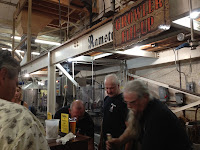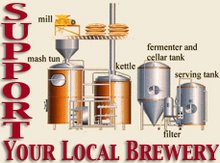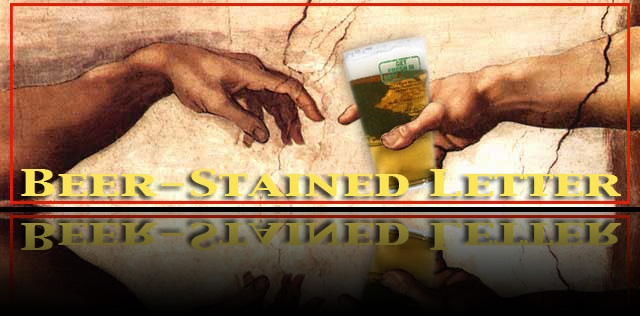"Where we'd like to be long term," says Mark Eldeson, one of the founders of Iron Hill Brewery & Restaurant, "is opening one a year for the next couple of years. We'd like to double our size in 10 years. That's what it's going to take."
The subject is Iron Hill's plans for another restaurant/brewery, it's 10th, this time in Voorhees, 10 miles south of the brewpub company's first New Jersey location in Maple Shade.
It's a Monday night in early June, and Mark's ensconced at the corner of the bar. A pair crutches propped up behind him lead your eyes to the left foot he injured during a recent soccer-coaching mishap. A healthy-size crowd swarms the bar area around him, turning out for the brewpub's release of
Spéciale Belge, a smoky amber ale brewed in Belgium last March by Brasserie DuPont's Olivier Dedeycker, with Iron Hill's Maple Shade brewer, Chris LaPierre, and Marlton homebrewer Vince Masciandaro, lending a hand to the makers of the storied
Saison DuPont for the one-off
Belge brew.
The beer christened Philly Beer Week 2012, on the preceding Friday, at the 10-day event's Opening Tap ceremonies. But having it on tap at Chris' home base still makes for a marquee night among local beer enthusiasts.
After sampling a pint of
Spéciale Belge at the bar and greeting some well-wishers, Mark retreats to a quieter back dining area to talk about that 10th brewery-restaurant, to open toward the end of this year (or early 2013) in the Voorhees Town Center, the former Echelon Mall partially razed and reborn as a cityscape – a wide thoroughfare lined with trees, street lamps and retail shops topped with townhouses.
Mark and partners Kevin Finn and Kevin Davies, all three New Jersey guys, founded Iron Hill in Delaware the mid-1990s. The three have turned the brand into a vibrant tri-state enterprise, a standout name in the beer worlds of Delaware, southeastern Pennsylvania and southern New Jersey.
Announced in late May, the Voorhees location will be the third to open since Maple Shade started pouring beer in 2009. Iron Hill's ninth location opened in the Chestnut Hill section of Philadelphia back in January. (Some folks will remember the continued efforts by Iron Hill open in New Jersey and that the Maple Shade location came about when prospects dimmed for a site in Barrington in Camden County.)
Followers of Iron Hill, Mark says, will find the Voorhees brewpub familiar: the signature murals by artist Jeff Schaller; the menu of appetizers, bar pies, sandwiches and dinners; the flight of house beers – pale ale, porter, and Vienna lager – backed up with Belgian ales and other creative and seasonal brews that have earned the company national recognition.
On those topics and more, Mark fielded a half-hour's worth of questions, offering some insight to what drives Iron Hill and how the über-hot craft beer market these days poses some special challenges for brewpubs.
Beer-Stained Letter: Talk a little bit about how you arrived at Voorhees for your 10th location.
Mark Edelson: Most of the stuff we've looked at in New Jersey has been South Jersey, obviously in that Philadelphia sphere. We dabbled in Monmouth County and northern counties ... I think we want to get a foothold in one area of New Jersey first, so South Jersey is
(pauses) ... We have such name recognition within the Philadelphia area. Before we opened here in Maple Shade, we had a ton of name recognition, which I think we wouldn't have had in northern New Jersey. We want to continue to bolster that ...
We actually had the Barrington deal going before we even set foot in Maple Shade. That just slogged on forever, and this deal came up. We're always looking for stuff and just waiting for deals to break loose that make sense. We were looking at the Voorhees deal for a while – same thing it started to break loose and made sense.
BSL: What were some of the considerations for it and the proximity to Maple Shade?
ME: We look at it in terms of
Is it too close to existing locations? We do a lot of ZIP code survey, so we pretty much know statistically where our customers are coming from. Although New Jersey has been fantastic for us, the radius of this location, Maple Shade, is very tight. Voorhees being not that far away, we don't think we're going to rob any of the business from Maple Shade.
When we first were considering South Jersey, all the naysayers were talking about how, both South Jersey and this particular site (Maple Shade), being off the (main track) ... It wasn't on (Route) 73; it was in flex space ... It was
Who would ever find this? and
How could we do well here? because there was a restaurant that did so-so here for a couple of years.
And you know what, we stuck with the numbers and the demographics, and they came right through for us. People didn't blink at finding us here. I think we'll find a similar experience in Voorhees as well.
BSL: The building you're going into in Voorhees, a little background about that.
ME: It used to be called the Echelon Mall ... It's now called the Voorhees Town Center. It was completely renovated. They renovated the old Echelon Mall. They razed about half of it, and built was its now called kind of a town center concept, where you have kind of a main street of retail. This one is mixed use, so there's condos ... It's nice; it's new space. The demographics there are terrific. We've got Haddonfield, Voorhees itself ... We are right off the PATCO line. It makes it a lot easier for people to come in and out of Philadelphia to visit us, at least Center City people, which could be great.
BSL: With craft beer, the market continues to be really hot. Which model, brewpub or production brewery, appears to be more to the forefront of the growth trend?
ME: We're in the restaurant business, and we really wax and wane with how restaurants are doing. Of course, having craft beer as something other restaurants can't deliver right on site, that's our niche; that's the differentiator for us, having an onsite brewery and all the great beers we have.
Other great restaurants near us won't necessarily have a great restaurant and great brewery in it as well. Craft (beer) doing well helps us. But I can't say we track exactly with craft beer, we track more with the restaurant industry. But having craft doing so well right now is really helping us on the brewery side.
BSL: In terms of bringing a brewery online, to give people a general idea of what it costs, what are we talking about in terms of expense?
ME: These days it takes us – with all the costs involved – $350,000-$400,000 to install, to get it all in there, and then the cost of operating. Some of the fights that we have politically here in New Jersey, that brewpubs have an edge over everybody because they make their beer so cheaply. That's such a myth. Anybody that's in the business will tell you, you plunk down 400 grand, that depreciation is rather expensive, and then when you really look at the costs, if you're really paying a (brewer) well and using the right ingredients and stuff like that, and then at the end of the day, it's costing you as much as it would to bring it in in keg, the craft beer.
Our belief is, it's not a cost issue, again it's a component that we can deliver. It's great beer that we control. It's a part of what we do, the onsite, the fresh, all of that, because we sell way more beer than a standard restaurant will sell; 22 to 25 percent of our sales are beer. We do 75 percent food, so there's no doubt we sell a lot of food. We're like most restaurants, but the beer component of other restaurants is much smaller, at least half, and then you've got liquor and wine in there as well. And we sell a fair amount of liquor and wine.
BSL: So then what's Iron Hill known more for, the beer or the food?
ME: Depends on who you ask. There are customers who join our mug club who never drink beer. Our mug club is our loyalty club; the moniker mug club is because we give out a mug. It's really a loyalty club ... I would say we've been wildly successful with our beer, especially in national awards, and whatnot. I think you can make the case that in a lot of circles, certainly, we're very famous for our beer. But certainly with our customers who live close by, it's the food. They love the beer, but they're not going to go out and drink beer every night. But they are going to go out and eat every night. Our business is driven by the kitchen. There's no doubt about it, and the beer thrives because of a thriving kitchen. I don't know that if we didn't have a great kitchen that the beer would drag the kitchen along.
I think that's where you run into issues in the industry that people aren't focused enough on the food. People in the beer business shouldn't get into the restaurant business. You need to be focused on both aspects. And people in the restaurant business shouldn't get into the beer business ... They think it's this moneymaker, and they lose heart and they pay a guy bare minimum and don't give him the money to order the ingredients he wants. And then you're not making great beer, you know. You're making adequate beer ... At the end of the day, people are going to come to us because we're a really good restaurant, and then they're going to realize how good the beer is, and they're going to drink a lot of the beer.
BSL: In the three years the Maple Shade location has been open, there have been some really unique beers to come out of here, and they've been driven by the customer base. It's safe to say you'll be looking for the same out of Voorhees?
ME: It's interesting, because when the brewer goes in, he's got to weigh what he likes personally vs. what the customers like, or what he thinks the customers want. That's always a debate we have. There's always a personal bias – even I have a personal bias. The advantage of being in a brewpub situation is that your customers, you can look 'em right in the eye. They'll tell you want they want.
 |
| Chris LaPierre with Vince Masciandaro |
Right now, everyone wants hoppy beers. Everybody does, no matter where you go; that's all they want to hear is about hoppy beers. I swear, if you put
IPA behind half our brands, they'd double the sales, without blinking. That's just how crazy it is. And the new varieties of hops coming out, it's an interesting dynamic. And admittedly, we've been slow to that punch. We want to brew a great variety of beers, and we want to be balanced with that. We have a hard time keeping up with keeping so many hoppy beers on tap. You just don't want to come in and have six hoppy beers on ... we want to introduce people to our whole palette of flavors. So that's what the brewer has to balance.
BSL: Being an Iron Hill location, people can expect the flagship beers like Ironbound Ale, Pig Iron Porter ...
ME: Sure ...
BSL: ... and that component of Belgian styles.
ME: And there's five of those, and tonight we've got 17 beers on tap. Generally, Chris carries 14 to 15 beers on tap. For a brewpub, that's difficult ... We used to be the eight-beer brewpub. We realized that that is not the future, that with all the beer bars popping up that can put 30 beers on that are outstanding and world-class by picking up the phone and ordering it, then we better do something new. We made some changes in our philosophies and our approach to it and some equipment changes that allow the brewer to sustain a bigger variety ... We've gotten some comments from some customers here in New Jersey that they love, as a brewpub, how many beers we have on tap, because of the variety they walked in to ...
BSL: So reading that scenario correctly ...
ME: It's hard for us to compete. They (beer bars) could kick our ass.
BSL: So breweries at the pub level should all be taking notice, should be thinking along that line?
ME: Absolutely. You walk into a brewpub and there's six beers on, people are going to walk out these days. Gordon Biersch, their big thing is five great German beers. And they're digging their heels in on that. I gotta tell you, I disagree with that. That is not what people want. They respect the quality of those beers, but people (say)
I've had this one. It's great beer and all, but give me something more. They've got one new seasonal; the brewer's allowed one seasonal. We're the opposite – we've got five and the brewer is allowed seven or nine more. But you know, it drives (our brewers') energy and creative juices, too.

 And for a garnish – the part that stuck in Sal's mind – Nick says the serving glasses are rimmed with roasted pumpkin seeds and more pie spices to, well, spice up the drinking experience.
And for a garnish – the part that stuck in Sal's mind – Nick says the serving glasses are rimmed with roasted pumpkin seeds and more pie spices to, well, spice up the drinking experience.  For their 2-barrel batch, they started with about 160 pounds of grain – Briess 2 Row, some biscuit malt (you want that pie crust notion), some caramel malt and special roast. To that mash, they added 30 pounds of pumpkins bought from a Cumberland County farmstand. (Last year, they used Libby's canned pumpkin.)
For their 2-barrel batch, they started with about 160 pounds of grain – Briess 2 Row, some biscuit malt (you want that pie crust notion), some caramel malt and special roast. To that mash, they added 30 pounds of pumpkins bought from a Cumberland County farmstand. (Last year, they used Libby's canned pumpkin.)












































